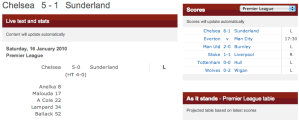What’s The Score? And Whose Score Is It, Anyway?
Posted by Brian Kelly on 17 Jan 2010
What’s the Score?
What was the score in yesterday’s Chelsea versus Sunderland game? The final score was 7-2 – and according to the BBC Web site the score at one stage was simultaneously 5-0, 5-1 and 6-1!
I managed to capture a screen image showing this inconsistency. This was slightly cumbersome to do as for my first attempt the page updated so that the scores were consistent before I completed the screen capture – and I failed to notice this before I published a tweet. I was somewhat surprised, but pleased, to find that I could launch another browser (Opera) and replicate the inconsistencies – at which point I quickly disconnected from the Internet prior to capturing the screen image before the display was updated.
As well as being an incident that Chelsea fans may appreciate, I thought it was also interesting example of issues such as assumptions of trust (“it’s on the BBC Web site – it must be correct”), technical complexities (the individual scores were correct at one stage – the inconsistencies were possibly due to caching problems with data coming from multiple sources), the possible dangers of scraping HTML pages, etc.
Whose Score Is It, Anyway?
Since my blog posts are published with a Creative Commons licence if anyone else wishes to reuse this example, perhaps in the content of new media literacy, you will be free to do so. Except, of course, the screen image is taken from the BBC Web site – and the scores and details of the fixture seem to be the copyright of Football Dataco Limited, a company which has a very long and detailed Rights Information page. However as is often the case Wikipedia provides a useful summary of the company:
Football DataCo is a British company in the football (soccer) industry that grants licences to third parties (such as newspapers) allowing them to reproduce certain intellectual property (such as fixture lists and statistics) owned by the UK’s four professional football leagues: the Premier League, The Football League, the Scottish Premier League and the Scottish Football League.
The article goes on to describe the controversy surrounding Football Dataco’s ownership claims for the fixture list:
The company has been racked by controversy in the UK media, after a 2004 European Court of Justice ruling that the Premier League and Football League cannot use the European Database Directive to demand payment from media and pools companies for the publication of fixture lists. Football DataCo refute the ruling, arguing that a legal precedent was set in the UK back in 1959, when the Football League won a landmark copyright victory against Littlewoods, claiming income from the pools company for their use of the fixtures list.
Staunch opponents of Football DataCo argue that the ruling is long out of date, and needs to be brought more inline with the advances in information collection and delivery that we are seeing with the world wide web.
When I started looking at the ownership of football information I remembered that I used to follow a Twitter account which provided updates on Premier League football scores, but that service was shut down after the developer (@ollieparsley) received a Cease-and-Desist letter from Football DataCo. Ollie has written a blog post entitled “The FootyTweets ‘Cease and Desist’ Story” about this.
Back To Ownership
This post began when I thought it would be useful to capture the surprising screen image from the BBC Web site. I thought that this would make an interesting example to use in one of my talks about trust. But the post seemed to go in a new direction when I started to explore the copyright issues. Perhaps, as I suggested in a post on “How I Use Creative Commons For My Presentations” there’s a need to take a risk management approach to making use of such football scores. But isn’t that approach condoning the rights of large companies to take ownership of what should be public information?
PS I’ve just noticed that this is post number 666. I’ll say more.





Phil Bradley said
Interesting stuff. This is not however the first time that they’ve managed to totally mess up results. Try: http://philbradley.typepad.com/phil_bradleys_weblog/2009/04/bbc-news-mess-up-footie-results.html
Chris Rusbridge said
I think there’s a legal precedent in the same area relating to horse-racing (BHB versus William Hill); roughly translated, the names of the horses in a race were facts, and the selection of horses for the race wasn’t relevant to the database. And the Database Directive refers to “substantial portions” as well. It’s all very dodgy. See among others Waelde, C., & McGinley, M. (2005). Public Domain, Public Interest, Public Funding: Focussing on the ‘Three Ps’ in Scientific Research. SCRIPT-ed, 2, 71-97. Retrieved from http://www.law.ed.ac.uk/ahrc/script-ed/vol2-1/3ps.pdf.
Geeks, Linked Data and the World Cup « UK Web Focus said
[…] awareness of the issues associated with ownership of data. As I described in a post entitled What’s The Score? And Whose Score Is It, Anyway? according to an entry in Wikipedia the fixture list for UK’s four professional football leagues: […]